Mozambique: Football league needs €1.3M for airline tickets to resume Moçambola matches - Watch
AFCON | The Mambas’ next opponents: Cabo Verde

Photo courtesy: Federação Cabo-verdiana de Futebol
The Cape Verde football team represents a country made up of ten islands, located approximately 400 miles off the west coast of Africa.
Their 14th position in the CAF ranking gives the “Blue Sharks” the deserved and hard-earned title of the best of the four PALOP teams competing in the 34th edition of the African Cup of Nations, taking place in Ivory Coast between January 13th and February 11th this year.
They qualified for this edition with great ease, confirming their qualification with one round to go and hope to equal or even improve their performance from their debut in CAN 2013, when they reached the quarter-finals.
“United Nations” team
Although hardly a candidate for the title, especially since they are appearing for only the fourth time at the continent’s biggest football tournament in a competition that includes 12 champions from the 33 previous editions, Cape Verde draws attention for one particularity: it is the only selection in CAN 2023 with 24 players selected from 24 different clubs, based in 16 countries, and only defender Ianique dos Santos Tavares “Stopira” plays for a Cape Verdean club.
This is not necessarily unusual, especially for countries in Africa with extended diasporas and histories of European colonialism. For example, eight athletes from Côte d’Ivoire were not born in the country hosting the African Cup. Algeria has 14 athletes born abroad, while Morocco has 17.
The slight difference in relation to Cape Verde is the variety of places where its squad comes from. All but one of Côte d’Ivoire’s eight players were born in France. Algerians come from France and the Netherlands. Morocco has players born in four different countries, but it is unusual for a national team to be based on such a heterogeneous group.
Widespread migration from Cape Verde, which until 1975 was part of Portugal, began in the 1960s and ’70s, leading to the establishment of significant Cape Verdean communities in France, the Netherlands, the USA and, of course, Portugal. The native Cape Verdeans spread out, settled down and it is their children – or their children’s’ children – who today form the basis of the national football team.
But it took a while for them to tap into this diaspora. For example, when the country debuted in the continental tournament in 2013, of the 23 players selected, 18 were born on the Cape Verde islands. It was from 2018, in the second constellation of coach Rui Águas, former star of Benfica, FC Porto and of the Portuguese national team, that a significant boost was given to the recruitment of descendants spread across the four corners of the world. The matrix of what is today a kind of global selection was launched. In many ways, Cape Verde is like a modern cosmopolitan club. While many national teams are made up of players from similar backgrounds and cultures, Cape Verde is more cosmopolitan.
Crioulo, the key to union
Four players selected for this year’s tournament are Dutch by birth, including Fortuna Sittard midfielder Deroy Duarte. “It’s something special,” Águas says of the diversity within the team. “A lot of players come from different countries, have had different upbringings, different environments, but when we focus it feels like we’ve all been together for a long time.”
Midfielder Jamiro Monteiro, who was also born and raised in the Netherlands, son of Cape Verdean parents, adds: “We are a small country, but Cape Verdeans are everywhere. They all come from different countries, but the most important thing is for us to understand each other.”
The key to this is the language which, in the case of Cape Verde, is Creole (Crioulo) – or, more specifically, a Cape Verdean version of Creole that is exclusive to the islands. It helps them feel like they not only have something in common, but something that no one else has.
“Creole is the dominant language in the squad,” says defender Roberto Lopes, who plays for Shamrock Rovers in Ireland, the country where he was born and whose primary language is English. “In the country, everything is taught in Portuguese, but people speak Creole. It is a very difficult language to learn unless you are around Cape Verdeans because there is no literature to study. It creates a feeling of unity. When we are training or at the hotel, there is always Cape Verdean music playing. You get a sense of the culture and heritage.”
Pride and patriotism
In national teams that feature a significant number of players who were born and raised outside the country, there is sometimes a prejudice that they will not be as committed as “native” players. It’s common when things don’t go well to blame “foreign” players for their alleged lack of commitment and patriotism.
However, Cape Verde projects a different scenario. The main reason is that the players’ motivation is not just personal: the reason they represent a nation other than where they were born is their parents. Therefore, in most cases, they play more for the pride of their families than for themselves. It’s about something bigger than them.
“Playing for the land of your parents, for the country of your family, is different,” says Jamiro Monteiro, who plays for the San Jose Earthquakes in the North American Soccer League. “For me, it feels like I was born there. I can’t describe the feeling when I go there and the way people see you and respect you.”
It’s a sentiment echoed by Laros Duarte, who highlights that his family “also receives a lot of love and credit because his sons are playing for Cape Verde”.
There is, again, the feeling that the Cape Verde national team is just a great place to spend some time, but the players are keen to make it clear that this will not be a holiday getaway where everyone has a lovely few weeks away from home.
“We want to make history,” says Duarte. “We want to put Cape Verde even more on the map. It will be great if we reach the round of 16, but also playing in a way that the fans like.”
This is the summary profile of the team that Mozambique is preparing to face in the 2nd round of the CAN 2023 group stage, after having achieved a historic 2-2 draw against Egypt, in the same round in which the Cape Verdeans stunned by defeating Ghana 2-1 to take the lead in group B.
In their history of clashes, the Mambas and the Tubarões Azuis won two games each and drew once. They have not crossed paths since that fateful afternoon of March 30, 2021 when the Mambas, playing at home and needing to win to level the direct confrontation, lost 1-0 to Cape Verde at Zimpeto National Stadium and saw their return to the African Cup of Nations postponed yet again.
Is this time for the Mozambicans’ revenge?
By Henrique Aly, journalist at Super Sport
Profile of Cape Verde Islands team for 2023 Africa Cup of Nations – Reuters

Factbox on Africa Cup of Nations qualifiers Cape Verde Islands.
Africa Cup of Nations record:
Previous appearances in finals: (3) 2013, 2015, 2021
Best performance: Quarter-finalists 2013
Drawn in Group B with Egypt, Ghana and Mozambique.
Coach: Bubista
Pedro Brito Leitao, known as Bubista, played as a defender for Cape Verde for 14 years, captaining the national team, while playing club football in Angola and Spain, before moving onto a coaching career. He worked at local clubs Mindelense, Academica Mindelo, Sporting Praia and Batuque, winning regional and national championships, before taking over from Rui Aguas as national team coach in January 2020. At the last Cup of Nations finals in Cameroon, he was confined to his hotel room for his side’s opening two games because of a COVID-19 infection.
Key player: Ryan Mendes. Age: 33. Forward.
Mendes has played in all three of Cape Verde’s previous Cup of Nations finals appearances and is both captain and the country’s most capped international, with 66 appearances since his debut in August, 2010 when he was 20-years-old. He moved from Cape Verde as a promising junior to France, where he played Ligue 2 football with Le Havre and then in Ligue 1 with Lille. The left winger’s club career has included time spent on loan at Nottingham Forest and also at clubs in Turkey and the United Arab Emirates.
FIFA world ranking Dec. 2023: 73
How they qualified: Runner-up in Group B, behind Burkina Faso but ahead of Togo and Eswatini
Squad
Goalkeepers: Marcio Rosa (Anadia), Dylan Silva (Sintrense), Vozinha (Trencin)
Defenders: Joao Correia (Chaves), Logan Costa (Toulouse), Diney (Al Bataeh), Roberto Lopes (Shamrock Rovers), Steven Moreira (Columbus Crew), Stopira (Boavista da Praia), Dylan Tavares (Bastia)
Midfielders: Patrick Andrade (Qarabag), Cuca (Uniao Leiria), Deroy Duarte (Fortuna Sittard), Laros Duarte (FC Groningen), Joao Paulo (Sheriff Tiraspol), Kevin Pina (FK Krasnodar), Jamiro Monteiro (San Jose Earthquakes), Kenny Rocha (AEZ Zakakiou)
Forwards: Bebe (Rayo Vallecano), Djaniny (Al Fateh), Ryan Mendes (Karagumruk), Garry Rodrigues (Ankaragucu), Jovane (Salernitana), Willy Semedo (Omonia Nicosia), Bryan Teixeira (Sturm Graz), Helio Varela (Portimonense).
READ: Afcon 2023: Underdogs shine and ex-champions struggle at Africa Cup of Nations



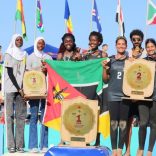
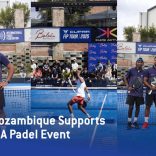
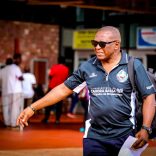
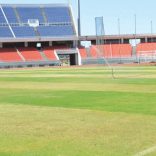
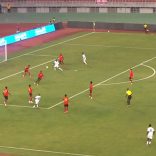





Leave a Reply
Be the First to Comment!
You must be logged in to post a comment.
You must be logged in to post a comment.